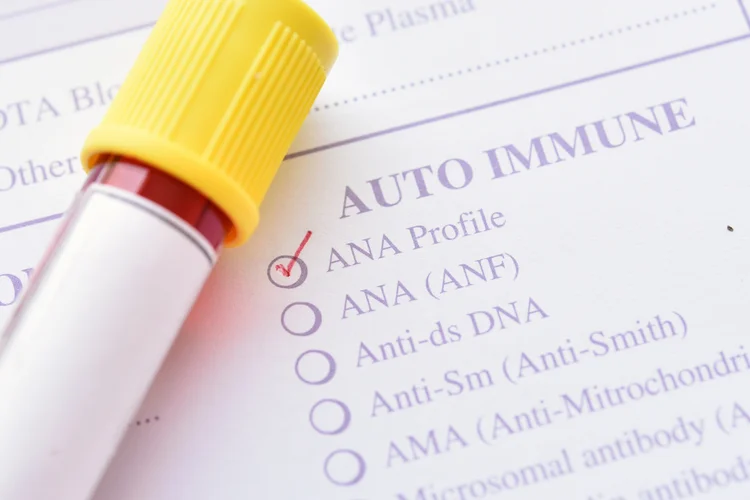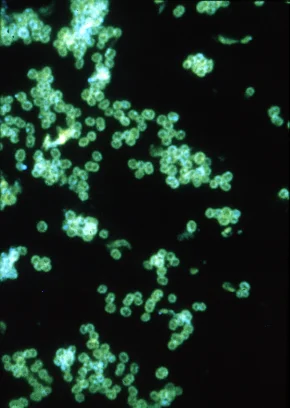Antinuclear Antibody (ANA) Test
What Is the Antinuclear Antibody (ANA) Test?
The Antinuclear Antibody (ANA) Test is a blood test that detects antinuclear
antibodies in your blood, which can indicate autoimmune conditions. Antinuclear
antibodies are a type of autoantibody, proteins produced by the immune
system that mistakenly attack healthy cells instead of harmful pathogens.
This abnormal immune response can cause tissue damage and is associated with autoimmune
diseases such as systemic lupus erythematosus,
rheumatoid arthritis, scleroderma, and Sjögren's syndrome.
Why Is an ANA Test Performed?
Doctors may recommend an ANA test if they suspect an autoimmune condition, particularly when
symptoms such as the following are present:
- Persistent fatigue
- Joint pain or swelling
- Skin rashes, particularly a butterfly-shaped rash on the face
- Sensitivity to sunlight
- Fever without an apparent cause
How Is the ANA Test Performed?
The ANA test involves drawing a blood sample, which is then sent to a laboratory for analysis.
Techniques such as indirect immunofluorescence or enzyme-linked immunosorbent assay (ELISA) are used
to detect and measure antinuclear antibodies.
No special preparation is required for the test. However, it is important to inform your doctor
about any medications or supplements you are taking, as these may affect the results.
ANA Test Results Interpretation
The ANA test determines whether antinuclear antibodies are present in the blood and
identifies their patterns. Common patterns, such as
homogeneous, speckled, and nucleolar, can provide insights into specific autoimmune
conditions.
-
A positive result indicates the presence of antinuclear antibodies,
which may suggest an autoimmune disorder. However, it is not definitive, as false
positives can occur in that healthy individuals may test positive without any underlying
condition. Additional tests and clinical evaluation are needed to confirm a diagnosis.
-
A negative result indicates no detectable antinuclear antibodies,
suggesting an autoimmune disorder is less likely. However, false negatives are also
possible, meaning the test may fail to detect antinuclear antibodies even if an
autoimmune condition is present.
ANA Test Price
At ATA Medical, we provide the ANA test and other blood
tests at the following price:
|
Test
|
Price*
|
| Consultation |
From $49.05 |
| Anti-Nuclear Antibody (ANA) Test |
$65.40 |
|
Full Blood Count
|
$17.44 |
| Full Blood Count (with ESR) |
$26.16 |
Auto Immune Profile 1
ESR, Anti-ds DNA, Anti-Nuclear Antibody
|
$85.02 |
Auto Immune / Lupus Profile 2
C3 Complement, C4 Complement, Anti-ds DNA, Anti-Nuclear Antibody
|
$136.25 |
Auto Immune / Lupus Profile 3
Full Blood Count, ESR, Albumin, Urea (BUN), Creatine, C3 Complement, C4 Complement,
Rheumatoid Factor, Anti-ds DNA, Anti-Nuclear Antibody, Urine FEME
|
$163.50 |
*Prices are NETT (where applicable) and inclusive of GST.
^Prices last updated on
Jan 28, 2026. While every effort is made to keep pricing information up to date, please contact our team to confirm the latest rates.
We also offer personalised blood tests and health screening
packages. These include options for home health
screenings or blood tests at a location of your choice for greater convenience. Please get
in touch with us for further details.
How Long Does an ANA Test Take?
At our clinic, the blood test typically takes 30 to 60 minutes during non-peak hours. Test results
are usually available within 3 to 5 days, and your doctor will communicate them to you via phone or
email.
Where to Do an ANA Test?
ATA Medical @ Orchard
Address: 1 Orchard Blvd, #05-09 Camden Medical Centre, Singapore 248649
Nearest MRT: Orchard Boulevard Station (TE13)
Contact Number: 6223 0682
Email: camden@atamed.sg
Opening Hours:
Mon - Fri: 8:30 AM to 12:30 PM, 1:30 PM to 5:30 PM
Sat: 8:30 AM to 12:30 PM
Sun & PH: Closed
ATA Medical @ Tanjong Pagar
Address: 72 Anson Rd, #01-02 Anson House, Singapore 079911
Nearest MRT: Tanjong Pagar Station (EW15)
Contact Number: 6223 0682
Email: hi@atamed.sg
Opening Hours:
Mon - Fri: 8:30 AM to 12:30 PM, 1:30 PM to 5:30 PM
Sat: 8:30 AM to 12:30 PM
Sun & PH: Closed
ATA Medical @ Jurong
Address: 21 Jurong Gateway Rd, #02-08 CPF Jurong
Building, Singapore 608546
Nearest MRT: Jurong East MRT Station (NS1/EW24)
Contact Number: 6348
6292
Email: jurong@atamed.sg
Opening Hours:
Mon - Fri: 8:30 AM to 12:30 PM, 1:30 PM to 5:30 PM
Sat: 8:30 AM to 12:30 PM
Sun & PH: Closed
Navigate to Us
Frequently Asked Questions (FAQ)
Yes, HIV infection can sometimes lead to a positive ANA test. This is
because HIV affects the immune system, potentially triggering the production
of autoantibodies, including antinuclear antibodies. However, a positive ANA
test does not indicate HIV. The most reliable way to diagnose HIV is through
specific HIV tests.
A positive ANA test result indicates the presence of antinuclear antibodies
in your blood. While this may suggest an autoimmune disorder, it is not
conclusive. Additional tests and clinical evaluation are needed to confirm
the diagnosis and determine the specific condition, if any.
The ANA blood test is a diagnostic test used to detect antinuclear
antibodies in the bloodstream. These antibodies are autoantibodies that
mistakenly attack the nucleus of healthy cells. Their presence may indicate
autoimmune disorders such as systemic lupus erythematosus, rheumatoid
arthritis, or scleroderma.
The normal range for an ANA test is typically a negative result, meaning no
detectable antinuclear antibodies. A result reported as 'negative' or below
the threshold set by the testing laboratory is considered normal.
A positive ANA test indicates the presence of antinuclear antibodies in your
blood, which may suggest an autoimmune condition. However, further testing
is needed to identify the specific cause. False positives can occur, meaning
the test may suggest a condition even in healthy individuals without any
underlying disease.
Certain cancers, including some types of leukaemia, lymphoma, and breast
cancer, have been associated with positive ANA results. However, a positive
ANA test alone cannot confirm cancer. More reliable and specific diagnostic
methods, such as imaging scans and biopsies, are required for accurate
detection and diagnosis.
Specific ANA patterns are linked to particular diseases. For example, a
homogeneous pattern is commonly associated with systemic lupus erythematosus
(SLE). A speckled pattern may indicate conditions such as Sjögren's syndrome
or scleroderma. A nucleolar pattern is often seen in scleroderma. These
patterns provide clues to help identify potential autoimmune disorders.
Antinuclear antibodies themselves do not directly cause joint pain. However,
autoimmune conditions linked to a positive ANA test, such as systemic lupus
erythematosus or rheumatoid arthritis, often have joint pain as a common
symptom.
If your ANA levels are high, it indicates a stronger presence of antinuclear
antibodies. This may suggest an autoimmune condition, but further clinical
assessments and additional tests are necessary to identify the specific
cause.
Autoimmune disorders often present with a range of symptoms. Five common
signs include persistent fatigue, joint pain or swelling, skin rashes,
sensitivity to sunlight, and unexplained fever. These symptoms may vary in
severity depending on the specific condition.
A positive ANA test is not treated on its own, as it is simply a result that
indicates the presence of antinuclear antibodies, not a condition by itself.
Treatment is directed at managing the underlying autoimmune disorder, if one
is diagnosed. This may involve medications such as immunosuppressants,
anti-inflammatory drugs, or other therapies tailored to the specific
condition.
Yes, COVID-19 has been associated with positive ANA test results in some
individuals. This is thought to be due to the immune system's overactivation
during infection. However, the presence of ANA after COVID-19 does not
necessarily indicate an autoimmune disease.
Chronic stress is believed to influence the immune system and may contribute
to the production of antinuclear antibodies, potentially resulting in a
positive ANA test. However, stress alone is not usually considered a direct
cause, and it can be difficult to definitively identify the exact trigger.
After a positive ANA test, your doctor will evaluate your symptoms, medical
history, and perform additional diagnostic tests, such as tests for
anti-dsDNA or anti-Smith antibodies, to identify the specific autoimmune
condition or rule out false positives.
The production of antinuclear antibodies can be triggered by various
factors, including autoimmune diseases, infections, certain medications, and
environmental influences. However, identifying a specific trigger is often
challenging, as it can vary from person to person.
A normal ANA level is typically a negative result, meaning no antinuclear
antibodies were detected in the blood. Laboratories may report this as
'negative' or below a specific titre threshold.
A positive ANA test may indicate an autoimmune disorder, but it is not
always a cause for concern. False positives can occur in healthy individuals
without any underlying condition. However, further evaluation is important
to rule out or confirm a diagnosis and to understand its significance in
your overall health.
Systemic lupus erythematosus (SLE) is often considered one of the more
serious autoimmune diseases, as it can affect multiple organs, including the
kidneys, heart, and brain. However, the severity of autoimmune diseases
varies based on the individual and the condition.
The first signs of lupus often include fatigue, joint pain, skin rashes
(especially a butterfly-shaped rash across the cheeks), sensitivity to
sunlight, and unexplained fevers.




